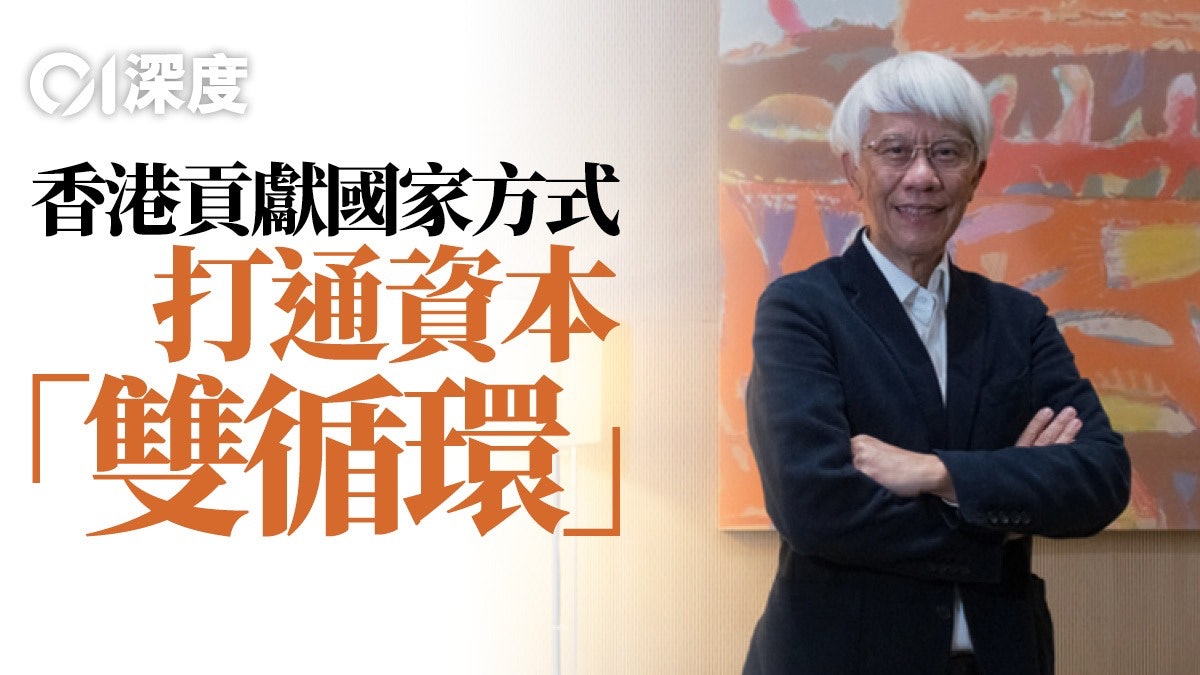If Hong Kong is compared to the starting point for the internationalization of the RMB, Ren Zhigang is the "shooter" standing at the starting line.
At a meeting in Beijing 20 years ago, he suddenly proposed the possibility of developing RMB business in Hong Kong and successfully persuaded the authorities to carry out related work.
In the blink of an eye, Hong Kong has grown into a global offshore RMB hub.
As the internationalization of the RMB is about to enter a new stage, the "Hong Kong 01" in-depth report group has an exclusive dialogue with the non-official member of the Executive Council and the first president of the HKMA, Ren Zhigang, to talk about the process of internationalization and Hong Kong's role in his eyes.
In 2001, at the invitation of the Hong Kong Association of Banks, Ren Zhigang, then President of the Monetary Authority, led a delegation to Beijing to discuss topics.
At a meeting with the State Administration of Foreign Exchange, he suddenly raised the possibility of developing RMB business in Hong Kong without consulting the delegation and colleagues of the Monetary Authority.
"I had a shortcoming in the past, that is, when I think of doing it, I will "go all the way"." Ren Zhigang once described himself as impatience and "want to do everything yesterday" in his 2014 book "Being in danger in peace".
But behind the "immediate" are long-term observations and accumulated thoughts.
After throwing out the proposal at the meeting, he immediately quoted political and economic currents and the Basic Law as support, and analyzed the necessity of establishing an offshore RMB regulatory system from the other side’s perspective, and finally succeeded in persuading the authorities-two years later, the State Council approved Hong Kong Developed personal renminbi business and unveiled the offshore renminbi market.
In 2001, Ren Zhigang, then president of the Monetary Authority, visited Beijing and raised the possibility of developing RMB business in Hong Kong. He did not consult the delegation and colleagues of the Monetary Authority beforehand.
(Information picture: Photo by Ou Jiale)
Hope "Two Systems" Contribute to the Country
Ren Zhigang recalled that he led a team to Beijing twenty years ago to discuss with the People’s Bank of China on setting up RMB business in Hong Kong. He saw that Hong Kong’s offshore RMB business was booming. "The most obvious change is at the level of international trade. Freely use the renminbi", but at the level of the capital market, that is, in terms of capital projects, "the renminbi is not widely used."
The fundamental reason for the backward use of renminbi capital account is that the mainland has not fully liberalized the convertibility of capital account.
Although, in the past ten years, the mainland government and Hong Kong have jointly launched investment channels such as QDII, QFII, Shanghai-Shenzhen-Hong Kong Stock Connect, Bond Connect, and cross-border wealth management, but there are still institutional, product, and quota restrictions.
However, "opening up capital projects is risky. If risk management is not done well, it will affect financial security." Ren Zhigang recognized the prudent attitude of mainland supervision. "Furthermore, finance is a service-oriented economy. If finance is not safe, how can it serve the real economy? Woolen cloth?"
Ren Zhigang pointed out that the current domestic circulation and international circulation of capital channels are not smooth, and the way the "two systems" can contribute to the country is to "open up one path."
He pays particular attention to Hong Kong's role in capital projects, hoping that Hong Kong, an offshore market, can "try first" in capital opening projects, while buffering risks and providing "regulated and regulated channels" for the internationalization of the renminbi.
Ren Zhigang pointed out that the current domestic circulation and international circulation of capital channels are not smooth, and the way the "two systems" can contribute to the country is to "open up one path."
The picture shows the People's Bank of China.
(Profile picture)
Fifteen years ago, renminbi-denominated stocks were promoted
"The pilot introduction of the renminbi stock trading system for the constituent stocks of the Hang Seng Index" is one of the specific suggestions that Ren Zhigang often publicly appeals for exploring capital account opening channels in the offshore market.
In fact, he had an idea as early as 2007.
At that time, Hong Kong's dim sum bonds (offshore renminbi bonds) had just started, and Ren Zhigang "can't help but" expressed his ardent expectation for the use of renminbi trading in the stock market in the Monetary Authority's column "Viewpoint".
He pointed out that two of the three financing channels in Hong Kong's financial system (that is, the banking system and the bond market) can handle RMB transactions. I believe that the third financing channel in the future, the stock market, can also handle RMB transactions. "In other words, If there is demand, stocks can also be listed and traded in RMB in Hong Kong."
Ren Zhigang pointed out that the use of RMB to trade stocks can strengthen Hong Kong's status as an international financial center.
(Profile picture)
The Monetary Authority should build a RMB stock trading platform
Ren Zhigang concluded in his interview that setting up a RMB stock trading system has three major "benefits" for Hong Kong.
First, it can strengthen Hong Kong's status as an international financial center.
"The international financial center is the international level of financing. It is a combination of investors and fundraisers from the mainland and foreign countries. This is a role that Hong Kong plays." He explained that the introduction of the RMB securities trading system can allow overseas Investors can have "one more choice" when buying China's concept stocks, allowing more capital to come to Hong Kong for gathering and financing.
Second, building a RMB stock platform can promote the use of RMB, and Hong Kong can also contribute to the country.
Ren Zhigang personally suggested that the Monetary Authority should build a platform for RMB stock trading.
Because the HKMA has a currency swap agreement with the People's Bank of China, and has mature management experience, it can effectively deal with the long-term and short-term risks of currencies and stocks.
The ultimate goal of the platform is to provide financial infrastructure to "provide liquidity for the Hong Kong stock market and the RMB market."
In the future, if international investors can become accustomed to trading in the capital market with RMB in Hong Kong, "RMB internationalization is a big step!"
Ren Zhigang pointed out that the renminbi stock trading system can alleviate the pressure on the Hong Kong monetary authority and prevent it from happening.
Being prepared for danger in times of peace and planning for Hong Kong's financial future
Third, the renminbi stock trading system can alleviate the pressure on the Hong Kong monetary authority and prevent it from happening.
"The Hong Kong dollar is the currency of an economy of 7.5 million people. From a realistic point of view, can we demand the currency of 7 to tens of millions of people to play a smooth payment role for the mainland’s 1.4 billion and international financial flows without causing Our currency risk?" Ren Zhigang emphasized his tone when he mentioned the word "smooth".
"Imagine if the Hong Kong dollar really plays this role, what is the scale of the outflow of funds into the Hong Kong dollar? When there is a sudden shock, will a smaller financial system bear such a large inflow and outflow of funds, will there be trouble or pressure?" Ren Zhigang talked about geological questions and deductions, although it has not yet become a reality, but it is a daydream.
"Being prepared for danger in times of peace" is the title of a book published by Ren Zhigang seven years ago.
These four words may also be the most appropriate adjectives used by this financial official who has accompanied Hong Kong through the storms and waves when planning for the future of Hong Kong's finances.





